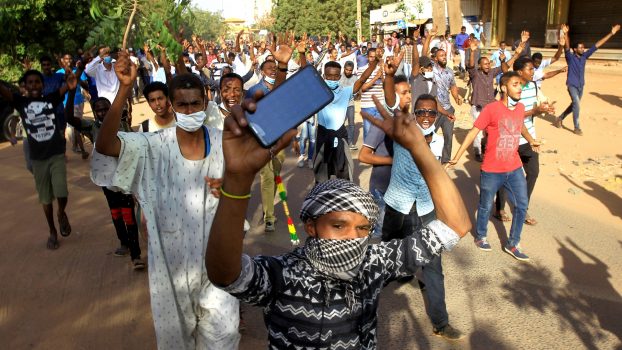 The death toll from protests in Sudan has risen to 29 as thousands of demonstrators continue to call on longtime ruler, Omar al-Bashir to step down.
The death toll from protests in Sudan has risen to 29 as thousands of demonstrators continue to call on longtime ruler, Omar al-Bashir to step down.
| According to the spokesman for the Sudanese Investigatory Committee, Amer Mohamed Ibrahim, authorities have imposed emergency laws and night-time curfews in some cities and suspended classes in schools and universities following the protests. |
Protests began in mid-December over price hikes on essential goods in the country but have since snow-balled into calls for President Omar Al- Bashir, who has been in power for 29 years to step down.
Since then, authorities in Sudan have used tear gas, rubber bullets, live ammunition and batons in a fruitless attempt to quell the unrest. They have also arrested opposition leaders, doctors, journalists, lawyers and students along with some 800 protesters.
In the latest crackdown against the protesters, security services loyal to Al-Bashir on Tuesday killed at least 14 anti-government protesters taking part in a mass sit-in outside the army headquarters in the country’s capital, Khartoum.
According to a statement issued by the Central Committee of Sudanese Doctors (CCSD), Tuesday’s deaths brought the total number of people killed during the protests since it started to 22, including five soldiers who were killed while defending the protesters.
The CCSD, which is affiliated with the Sudanese Professionals Association (SPA), the umbrella group at the forefront of the demonstrations said 153 others were wounded, adding that it expects the death toll to increase since some injuries were critical.
Protesters and the opposition Sudanese Congress Party (SCP) have called on the country’s military leadership to abandon Bashir, insisting however that they do not want a coup. They say they only want the army to join their demand for the establishment of a transitional government.
On Monday, Sudan’s Defence Minister, General Awad Ibnouf said that the military understood the reasons for the demonstrations against Bashir but would not allow any form of mayhem to take hold in the country.
Despite the rising pressure, the 75-year-old Bashir has not only refused to step down but has responded to the unrest with harsh measures, including the declaration of a state of emergency in February.
Bashir, who took power in the 1989 coup has acknowledged that the economic concerns raised by protesters were legitimate but insists that his opponents should seek power through the ballot box when his term ends in 2020.
Bashir is also wanted by the International Criminal Court in The Hague on charges of alleged war crimes and genocide connected with the suppression of a 16-year-old ethnic minority rebellion in the western region of Darfur.

ICC Issues Arrest Warrants For Netanyahu, Gallant And Al-Masri
Russia Fires Intercontinental Missile In Ukraine Attack — Kyiv
South African Police Raid Warehouses Amid Food Poisoning Deaths
Russian Missile Strike Kills Eight, Wounds 39 In Ukraine’s Odesa Region